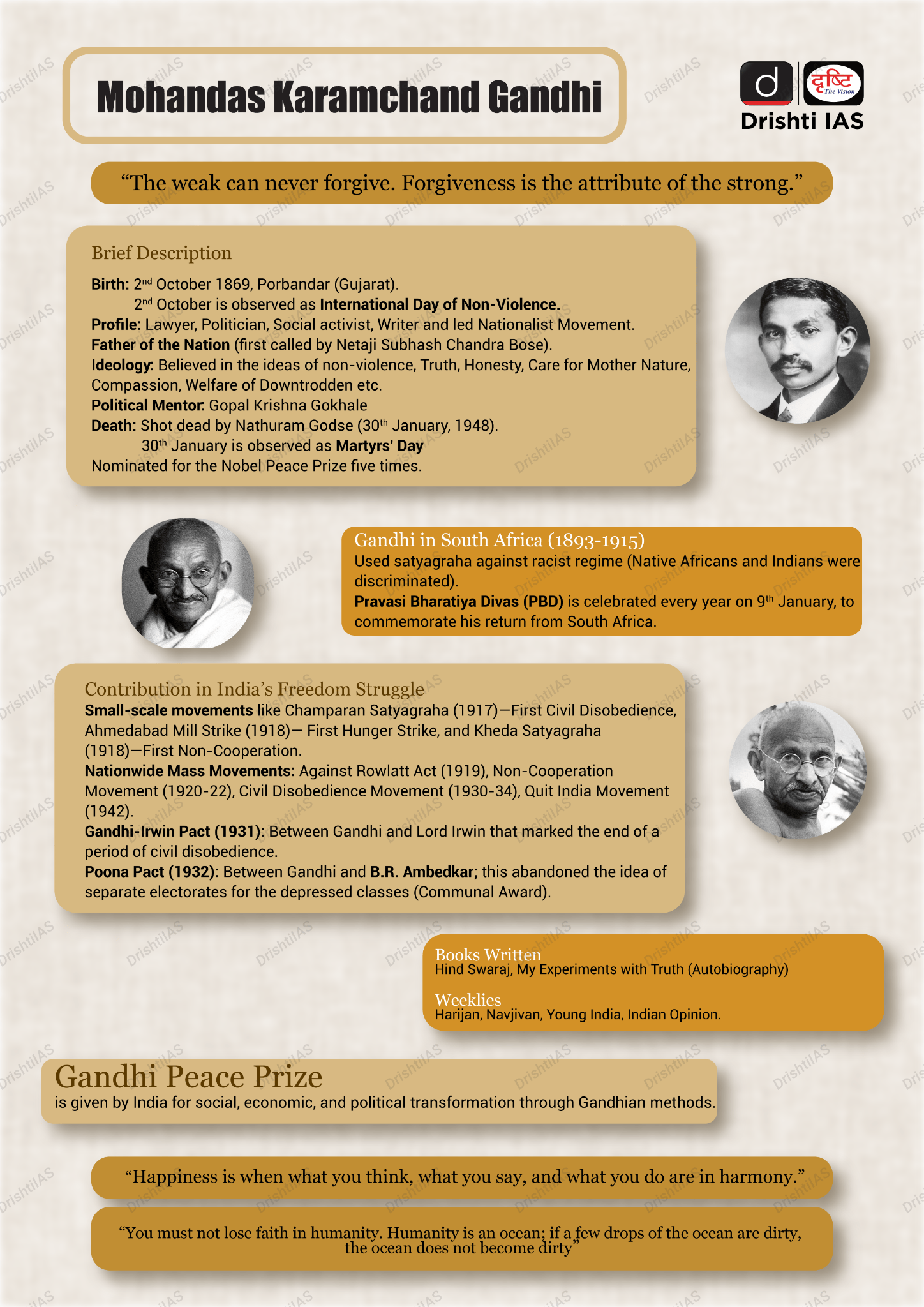Important Facts For Prelims
130th Anniversary of Natal Indian Congress
- 22 Aug 2024
- 7 min read
Why in News?
Recently, 22nd August 2024 marked the 130th foundation year of Natal Indian Congress (NIC) which was established in August 1894, based on a proposal by Mahatma Gandhi on 22nd May 1894.
- It was was formed to fight discrimination faced by Indians in South Africa.
What was the Natal Indian Congress?
- The Natal Indian Congress (NIC) was the first Indian Congress established, founded by Mahatma Gandhi in 1894 to fight against discrimination faced by Indian in Natal (province of South Africa).
- From the 1920s, the NIC operated under the South African Indian Congress (SAIC).
- The organisation underwent a shift towards more radical leadership in the 1930s-1940s with the emergence of Dr. G.M. Naicker, who became its leader in 1945.
- The NIC's increased militancy led to the imprisonment of several leaders by the 1950s and 1960s.
- Despite not being officially banned, repression and harassment led the NIC to halt activities until its revival in 1971 with a focus on civic work.
- In the mid-1980s, the NIC was key in forming the United Democratic Front (UDF).
- The UDF's goal was to establish a "non-racial, united South Africa.
What was the Role of Mahatma Gandhi in Satyagraha in South Africa?
- Mobilisation of Indian Community and Satyagraha:
- Natal Satyagraha: On 7th June 1893, Mahatma Gandhi faced racial discrimination when he was forced off a first-class train compartment at Pietermaritzburg railway station in South Africa. This incident ignited his spirit of civil disobedience through his first non-violent protest in the Natal Satyagraha.
- Gandhi established the Natal Indian Congress (NIC) to unite the Indian community and address issues like voting rights and discriminatory laws.
- Transvaal British Indian Association: In 1903, Gandhi founded this association to continue advocating for rights of Indian, particularly against increasing restrictions in the Transvaal region.
- Launching Satyagraha: In 1906, Gandhiji initiated his first satyagraha (nonviolent resistance) campaign in Johannesburg against the Asiatic Registration Act, leading to mass protests and civil disobedience.
- The Asiatic Registration Act of 1906 in Transaval required male Asians, particularly Indians and Chinese, to register, provide fingerprints, carry a registration certificate, and submit to physical examinations. It aimed to control and restrict the entry and movement of Asians in the region.
- Indians in South Africa resisted a discriminatory law by forming the Passive Resistance Association. They publicly burned their registration certificates, which brought negative attention to the South African government. Ultimately, the conflict ended with a compromise settlement.
- Natal Satyagraha: On 7th June 1893, Mahatma Gandhi faced racial discrimination when he was forced off a first-class train compartment at Pietermaritzburg railway station in South Africa. This incident ignited his spirit of civil disobedience through his first non-violent protest in the Natal Satyagraha.
- Organising the Ambulance Corps:
- During the Anglo-Boer War (1899-1902), Gandhi formed an Ambulance Corps of Indian volunteers to support the British, hoping for improved treatment of Indians, though this hope was not realised.
- Establishment of Communal Living:
- Gandhi founded the Phoenix Settlement in Durban in 1904 as a community living experiment.
- He had set up this farm after being inspired by a reading of John Ruskin’s Unto This Last, a critique of capitalism.
- He established the Tolstoy Farm near Johannesburg in 1910 to prepare Satyagrahis (followers of nonviolence).
- These initiatives aimed to foster self-reliance, promote communal harmony, and provide training in practical skills.
- Gandhi founded the Phoenix Settlement in Durban in 1904 as a community living experiment.
- 1913 Satyagraha Campaign:
- Gandhi led a major satyagraha against the poll tax, Registration of Marriages Act, and passed laws, with significant participation from Indian women, including his wife, Kasturba.
- Also, the Supreme Court had invalidated all marriages not conducted according to Christian rites, drawing the anger of the Indians and others who were not Christians.
- Gandhi led a major satyagraha against the poll tax, Registration of Marriages Act, and passed laws, with significant participation from Indian women, including his wife, Kasturba.
- Legal Reforms and Recognition of Indian Rights:
- The sustained pressure from Gandhi’s protests forced the South African government to pass the Indian Relief Act, 1914 addressing several of the Indian community's grievances.
- Impact of Gandhian Movements:
- Development of Satyagraha: Gandhi's experiences in South Africa were crucial in developing his philosophy of nonviolent resistance, which he later applied in India’s struggle for independence.
- Global Impact: Gandhi’s methods in South Africa laid the foundation for future civil rights movements worldwide and significantly influenced global efforts against racial and colonial oppression.
- Both Nelson Mandela and Martin Luther King were greatly influenced by Gandhiji and his satyagraha.
UPSC Civil Services Examination, Previous Year Question (PYQ)
Prelims
Q1. Who among the following is associated with ‘Songs from Prison’, a translation of ancient Indian religious lyrics in English? (2021)
(a) Bal Gangadhar Tilak
(b) Jawaharlal Nehru
(c) Mohandas Karamchand Gandhi
(d) Sarojini Naidu
Ans: (c)
Q2. With reference to the British colonial rule in India, consider the following statements: (2019)
- Mahatma Gandhi was instrumental in the abolition of the system of ‘indentured labour’.
- In Lord Chelmsford’s ‘War Conference’, Mahatma Gandhi did not support the resolution on recruiting Indians for World War.
- Consequent upon the breaking of Salt Law by Indian people, the Indian National Congress was declared illegal by the colonial rulers.
Which of the statements given above are correct?
(a) 1 and 2 only
(b) 1 and 3 only
(c) 2 and 3 only
(d) 1, 2 and 3
Ans: (b)





